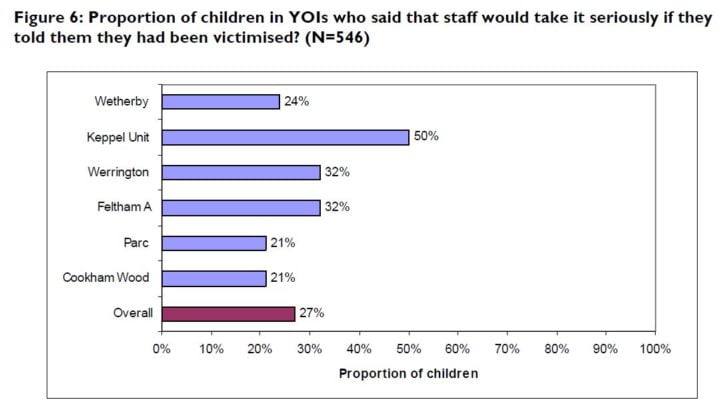Rewards more effective than sanctions
Fewer children and young adults have been in custody in recent years but the lives of those remaining have been “significantly impacted by deteriorating behaviour” that has not been tackled.
That’s the headline comment by Peter Clarke, HM Chief Inspector of Prisons, on today’s (21 March 2018) thematic inspection report: Incentivising and promoting good behaviour which is based on a review commissioned by the Youth Justice Board and focuses on children held in secure training centres (STCs) and young offender institutions (YOIs), and young adults aged 18–20 held in YOIs.
Current behaviour management schemes have been ineffective, particularly, in reducing violence, which is at historically high levels in all types of institution. Mr Clarke said:
The impact of poor behaviour by others on those who wish to make progress in education, training and rehabilitation can be severe.
The review looked at the “fundamentally important issue of the relationships between those detained and the staff charged with their care.”
Mr Clarke said:
Those relationships are crucially influenced by staff turnover, which can lead to a lack of consistency in approach, staff shortages and, all too frequently, a lack of sufficient time out of cell. The issue of inconsistency in behaviour management is important as it damages the all-important element of trust in the relationship.
Inspectors found that
Far too often the rewards and sanctions associated with behaviour management schemes were focused on punishment rather than incentive, and were prone to generate perceptions of favouritism. Too often, during inspections, we have seen rewards and sanctions schemes that are overwhelmingly punitive, and the response to poor behaviour is to become locked in a negative cycle of ever greater restriction.
Key findings
The review reached other key conclusions:
- Time out of cell: A combination of staff shortages and increasing levels of bullying and violence had led to many young people spending long periods of time in their cells with little to occupy them. Young people and staff agreed more time out of cell would have the greatest impact on promoting positive behaviour.
- Interventions for young people who display the most difficult behaviour: The proportion of children and young people in custody who have been convicted of more serious offences has increased. The report noted: “Too often we find institutions which accept poor behaviour as unavoidable instead of setting and maintaining high standards. However, there are now some young people within the estate who do not respond positively to existing behaviour management schemes and who require a higher level of support than is currently offered.”
- Bullying and violence: Witnessing or experiencing bullying and violence are part of everyday life for young people in custody.

- Young people from a black or minority ethnic background: They were less likely to report being treated fairly by the rewards and sanctions scheme than white young people. “As young people from a black and minority ethnic background make up a large proportion of the population in custody it is important that the reasons for these perceptions are understood and addressed to improve behaviour”.
Recommendations
The report makes one overarching recommendation:
Those working on residential units with young people should have the skills, and crucially the time, to build positive, caring and effective relationships with young people. Custodial institutions holding young people should be adequately staffed and management oversight of practice on residential units should be improved.
It also recommends that institutions should focus on rewarding, encouraging and celebrating positive behaviour rather than focusing on punitive measures for poor behaviour.








